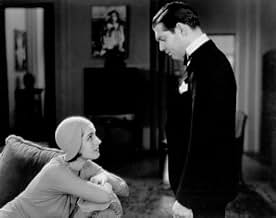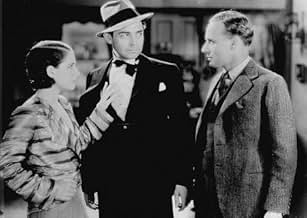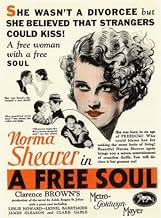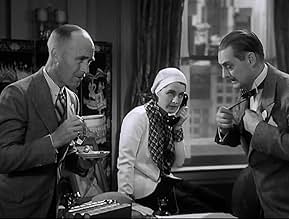NOTE IMDb
6,6/10
3,1 k
MA NOTE
Un avocat alcoolique qui a défendu avec succès un joueur notoire accusé de meurtre s'oppose à ce que sa fille libre-esprit s'engage dans une relation avec lui.Un avocat alcoolique qui a défendu avec succès un joueur notoire accusé de meurtre s'oppose à ce que sa fille libre-esprit s'engage dans une relation avec lui.Un avocat alcoolique qui a défendu avec succès un joueur notoire accusé de meurtre s'oppose à ce que sa fille libre-esprit s'engage dans une relation avec lui.
- Réalisation
- Scénario
- Casting principal
- Récompensé par 1 Oscar
- 4 victoires et 2 nominations au total
Roscoe Ates
- Man Shot at in Men's Room
- (non crédité)
Ann Brody
- Hamburger Saleslady
- (non crédité)
Edward Brophy
- Slouch
- (non crédité)
Clarence Burton
- Detective
- (non crédité)
James Donlan
- Reporter
- (non crédité)
Bess Flowers
- Birthday Party Guest
- (non crédité)
Francis Ford
- Skid Row Drunk
- (non crédité)
Henry Hall
- Detective in Raid
- (non crédité)
George Irving
- Johnson - Defense Attorney
- (non crédité)
Edward LeSaint
- Judge
- (non crédité)
Eric Mayne
- Party Guest
- (non crédité)
Sam McDaniel
- Casino Valet
- (non crédité)
Avis à la une
They are alike, this father & daughter. Liberal, passionate, willful - they live life on their own terms, disdaining their narrow-minded relations. Few regrets & even fewer apologies cloud either conscious - yet each harbors a character trait that threatens to destroy them. Hers is emotional instability; his, acute alcoholism. Although both will make bad choices that will haunt them, each will continue to see their reflection in the other, unique & individual, A FREE SOUL.
Based on a book by Adela Rogers St. Johns, Norma Shearer gets top billing in this aged but enjoyable soap opera, and she is very good, turning on the histrionics most effectively. But it is Lionel Barrymore who gets full honors - and a Best Actor Oscar - for his portrayal of her brilliant, tragic, lawyer father. Masterfully, he dominates his every scene. His final appearance, a tempestuous summation to a murder trial jury, is considered a classic.
Playing the two very different men in Shearer's life are Clark Gable & Leslie Howard. Gable is excellent, oozing the virility that was about to make him a huge star. Howard deftly underplays his less flashy role and becomes the film's calm center. James Gleason as Barrymore's factotum, and Lucy Beaumont as Barrymore's patrician mother, both give memorable performances. Film mavens will spot Edward Brophy as one of Gable's henchmen & master stutterer Roscoe Ates as the man in the washroom window.
Based on a book by Adela Rogers St. Johns, Norma Shearer gets top billing in this aged but enjoyable soap opera, and she is very good, turning on the histrionics most effectively. But it is Lionel Barrymore who gets full honors - and a Best Actor Oscar - for his portrayal of her brilliant, tragic, lawyer father. Masterfully, he dominates his every scene. His final appearance, a tempestuous summation to a murder trial jury, is considered a classic.
Playing the two very different men in Shearer's life are Clark Gable & Leslie Howard. Gable is excellent, oozing the virility that was about to make him a huge star. Howard deftly underplays his less flashy role and becomes the film's calm center. James Gleason as Barrymore's factotum, and Lucy Beaumont as Barrymore's patrician mother, both give memorable performances. Film mavens will spot Edward Brophy as one of Gable's henchmen & master stutterer Roscoe Ates as the man in the washroom window.
I thought A Free Soul an interesting exploration into the world of addiction--father Stephen Ashe, as played by Lionel Barrymore, struggles to balance his career as a defense lawyer and the disastrous effects his alcoholism has on his family and social life. Daughter Jan (Norma Shearer) has a similar problem--but her addiction is to a free and easy lifestyle, with no commitments and no responsibility. Both seem to be ways of dealing with an unspoken loss--perhaps that of a wife and mother. Again, as with all good storytelling, backstory is only hinted at but the characters are rich enough to imply a great deal of history. Refreshing to see Clark Gable as a suave, handsome but ultimately despicable character. A surprising lack of stereotypes for such a film-the Ashes are a patrician, proper family who virtually disown Stephen and his daughter, but they are shown to be intelligent, unique people none the less. A wonderful, melodramatic exploration of the relationship of a father and daughter. Some nice location work for an early talkie.
"A Free Soul" made Hollywood take notice of a young actor by the name of Clark Gable.Slapping leading lady Norma Shearer around,he portrayed masculinity like no star,with the exception of perhaps Jim my Cagney, had done before him.Lionel Barrymore won the Oscar for his very good performance of the alcoholic defense lawyer. I've always found him overacting his parts but he's very believable in this movie.Norma Shearer is also very good,but still overdoes the dramatics with her silent screen acting.But she's really a stunner in the quiet parts. Leslie Howard has once again one of his thankless parts which doesn't tax his ability at all.A very enjoyable picture.
To get an idea of how great magnetic and radiant shearer is here, consider that she matches her scenes with Clark Gable, lionel Barrymore and Leslie Howard and wipes the floor with all of them.
Don't get me wrong they are all very good here but this movie is a star vehicle for shearer and it is her movie. She does all of the shining.
If you appreciate her, this movie is a must see even though the film drags on and the script is average at best.
I wouldn't be surprised if this served as an inspiration to courtroom dramas like Perry Mason and Matlock later on.
A Free Soul (1931)
Clark Gable says, "I'm telling you." And Norma Shearer, dressed in a sexy silk dress, replies, "Oh no, you're not. Nobody is."
That sums up this astonishing movie. I can't believe A Free Soul is so little known, or that so many viewers don't get the depth of its meaning then...and now. Throw in three of the most amazing actors of the early 1930s--Lionel Barrymore, Clark Gable, and Norma Shearer--and you can't help be impressed, and moved, and intrigued. It's about strength of character (three or four characters, in fact). It's about being a modern person, and having modern problems. And it's about facing them, openly, honestly.
So what holds it back? Well, for one thing, it has a lot of talk, a lot of simple dialog about some very not simple things. If you accept the characters and their need to talk, you will see a very honest confrontation with alcoholism, and with what is at first a kind of sex addiction, or what is later developed to be simply unbridled love for a man outside of marriage. But the parallel between two temptations is real, and rather powerful, and the sacrifices each of the two afflicted characters make is intense. Barrymore (as the one nipping the bottle) and Shearer (as the one too much in love, or in love with lovemaking) play their parts perfectly. They have moments of extraordinary clarity, and moments of abandonment. And they confront each other in a way that is completely reasonable.
There are other aspects here worth at least lifting an eyebrow at, namely the very close relationship, almost as platonic lovers, between these two. Gable as a lovable but brutal and deceptive gangster is perfect, too--gorgeous and hard, charming and untrustworthy. The milieu is well developed, from barroom to hotel room to courtroom. This isn't a Warner Brothers knock-you-out crime film, it isn't even Three on a Match, for an example of a compromise between a woman's picture and a gangster flick. It's a heady drama, beautifully laid out and progressively involving, with director Clarence Brown (famous for a whole string of such interpersonal, romantic dramas over several decades) knowing what makes a film really matter.
Clark Gable says, "I'm telling you." And Norma Shearer, dressed in a sexy silk dress, replies, "Oh no, you're not. Nobody is."
That sums up this astonishing movie. I can't believe A Free Soul is so little known, or that so many viewers don't get the depth of its meaning then...and now. Throw in three of the most amazing actors of the early 1930s--Lionel Barrymore, Clark Gable, and Norma Shearer--and you can't help be impressed, and moved, and intrigued. It's about strength of character (three or four characters, in fact). It's about being a modern person, and having modern problems. And it's about facing them, openly, honestly.
So what holds it back? Well, for one thing, it has a lot of talk, a lot of simple dialog about some very not simple things. If you accept the characters and their need to talk, you will see a very honest confrontation with alcoholism, and with what is at first a kind of sex addiction, or what is later developed to be simply unbridled love for a man outside of marriage. But the parallel between two temptations is real, and rather powerful, and the sacrifices each of the two afflicted characters make is intense. Barrymore (as the one nipping the bottle) and Shearer (as the one too much in love, or in love with lovemaking) play their parts perfectly. They have moments of extraordinary clarity, and moments of abandonment. And they confront each other in a way that is completely reasonable.
There are other aspects here worth at least lifting an eyebrow at, namely the very close relationship, almost as platonic lovers, between these two. Gable as a lovable but brutal and deceptive gangster is perfect, too--gorgeous and hard, charming and untrustworthy. The milieu is well developed, from barroom to hotel room to courtroom. This isn't a Warner Brothers knock-you-out crime film, it isn't even Three on a Match, for an example of a compromise between a woman's picture and a gangster flick. It's a heady drama, beautifully laid out and progressively involving, with director Clarence Brown (famous for a whole string of such interpersonal, romantic dramas over several decades) knowing what makes a film really matter.
Le saviez-vous
- AnecdotesWhen the mule chases James Gleason, not a stuntman, is knocked down by the animal, a scene which wasn't planned, as Norma Shearer's reaction attests.
- GaffesAfter the cross-examination finishes, Stephen Ashe begins his summation to the jury. However, he is the defense attorney, and the prosecutor takes the first summation. This "factual mistake" is, in fact, not an absolute, as it depends on the state where the trial is held. For example, in a criminal case (which this is) in the Commonwealth of Pennsylvania, the defense goes first and the Commonwealth last. (If it were a civil case in PA, the Plaintiff would go first.)
- ConnexionsFeatured in Some of the Best (1944)
- Bandes originalesBy the River Sainte Marie
(1931) (uncredited)
Music by Harry Warren
Played as background music during the restaurant scene
Meilleurs choix
Connectez-vous pour évaluer et suivre la liste de favoris afin de recevoir des recommandations personnalisées
- How long is A Free Soul?Alimenté par Alexa
Détails
- Date de sortie
- Pays d’origine
- Langue
- Aussi connu sous le nom de
- Un alma libre
- Lieux de tournage
- Yosemite National Park, Californie, États-Unis(Jan, her father and Eddie go camping)
- Société de production
- Voir plus de crédits d'entreprise sur IMDbPro
Box-office
- Budget
- 529 000 $US (estimé)
- Durée
- 1h 33min(93 min)
- Couleur
Contribuer à cette page
Suggérer une modification ou ajouter du contenu manquant





































